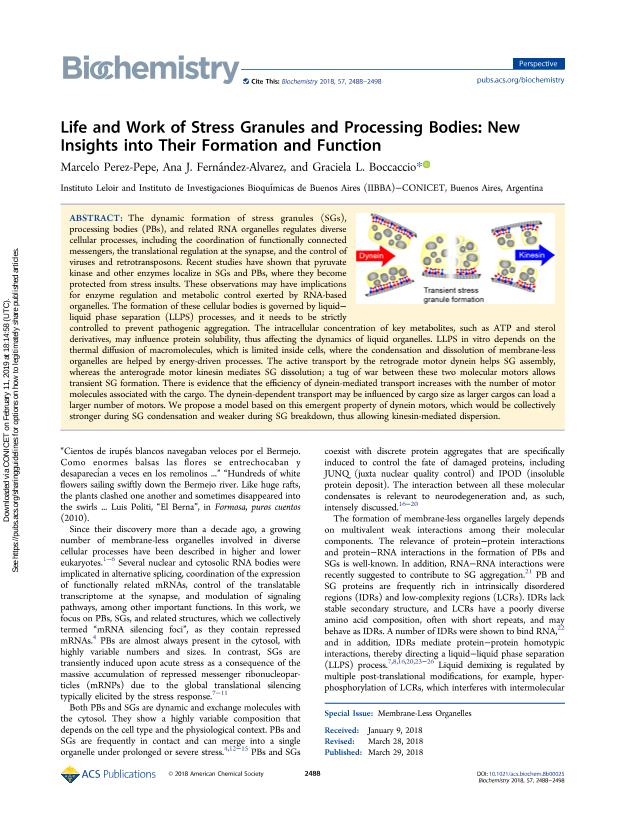Mostrar el registro sencillo del ítem
dc.contributor.author
Pérez, Marcelo

dc.contributor.author
Fernández Alvarez, Ana Julia

dc.contributor.author
Boccaccio, Graciela Lidia

dc.date.available
2019-10-29T17:30:11Z
dc.date.issued
2018-05
dc.identifier.citation
Pérez, Marcelo; Fernández Alvarez, Ana Julia; Boccaccio, Graciela Lidia; Life and Work of Stress Granules and Processing Bodies: New Insights into Their Formation and Function; American Chemical Society; Biochemistry; 57; 17; 5-2018; 2488-2498
dc.identifier.issn
0006-2960
dc.identifier.uri
http://hdl.handle.net/11336/87552
dc.description.abstract
The dynamic formation of stress granules (SGs), processing bodies (PBs), and related RNA organelles regulates diverse cellular processes, including the coordination of functionally connected messengers, the translational regulation at the synapse, and the control of viruses and retrotransposons. Recent studies have shown that pyruvate kinase and other enzymes localize in SGs and PBs, where they become protected from stress insults. These observations may have implications for enzyme regulation and metabolic control exerted by RNA-based organelles. The formation of these cellular bodies is governed by liquid-liquid phase separation (LLPS) processes, and it needs to be strictly controlled to prevent pathogenic aggregation. The intracellular concentration of key metabolites, such as ATP and sterol derivatives, may influence protein solubility, thus affecting the dynamics of liquid organelles. LLPS in vitro depends on the thermal diffusion of macromolecules, which is limited inside cells, where the condensation and dissolution of membrane-less organelles are helped by energy-driven processes. The active transport by the retrograde motor dynein helps SG assembly, whereas the anterograde motor kinesin mediates SG dissolution; a tug of war between these two molecular motors allows transient SG formation. There is evidence that the efficiency of dynein-mediated transport increases with the number of motor molecules associated with the cargo. The dynein-dependent transport may be influenced by cargo size as larger cargos can load a larger number of motors. We propose a model based on this emergent property of dynein motors, which would be collectively stronger during SG condensation and weaker during SG breakdown, thus allowing kinesin-mediated dispersion.
dc.format
application/pdf
dc.language.iso
eng
dc.publisher
American Chemical Society

dc.rights
info:eu-repo/semantics/openAccess
dc.rights.uri
https://creativecommons.org/licenses/by-nc-sa/2.5/ar/
dc.subject
stress granules
dc.subject
processing bodies
dc.subject
molecular motors
dc.subject
translation
dc.subject.classification
Biología Celular, Microbiología

dc.subject.classification
Ciencias Biológicas

dc.subject.classification
CIENCIAS NATURALES Y EXACTAS

dc.title
Life and Work of Stress Granules and Processing Bodies: New Insights into Their Formation and Function
dc.type
info:eu-repo/semantics/article
dc.type
info:ar-repo/semantics/artículo
dc.type
info:eu-repo/semantics/publishedVersion
dc.date.updated
2019-10-22T17:41:25Z
dc.journal.volume
57
dc.journal.number
17
dc.journal.pagination
2488-2498
dc.journal.pais
Estados Unidos

dc.description.fil
Fil: Pérez, Marcelo. Consejo Nacional de Investigaciones Científicas y Técnicas. Oficina de Coordinación Administrativa Parque Centenario. Instituto de Investigaciones Bioquímicas de Buenos Aires. Fundación Instituto Leloir. Instituto de Investigaciones Bioquímicas de Buenos Aires; Argentina
dc.description.fil
Fil: Fernández Alvarez, Ana Julia. Consejo Nacional de Investigaciones Científicas y Técnicas. Oficina de Coordinación Administrativa Parque Centenario. Instituto de Investigaciones Bioquímicas de Buenos Aires. Fundación Instituto Leloir. Instituto de Investigaciones Bioquímicas de Buenos Aires; Argentina
dc.description.fil
Fil: Boccaccio, Graciela Lidia. Consejo Nacional de Investigaciones Científicas y Técnicas. Oficina de Coordinación Administrativa Parque Centenario. Instituto de Investigaciones Bioquímicas de Buenos Aires. Fundación Instituto Leloir. Instituto de Investigaciones Bioquímicas de Buenos Aires; Argentina
dc.journal.title
Biochemistry

dc.relation.alternativeid
info:eu-repo/semantics/altIdentifier/doi/https://dx.doi.org/10.1021/acs.biochem.8b00025
dc.relation.alternativeid
info:eu-repo/semantics/altIdentifier/url/https://pubs.acs.org/doi/10.1021/acs.biochem.8b00025
Archivos asociados
